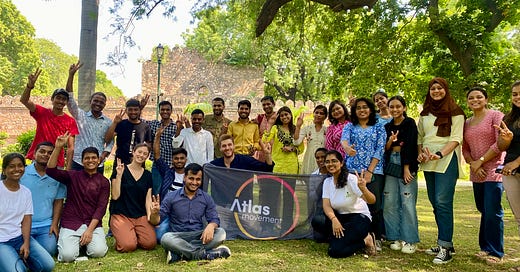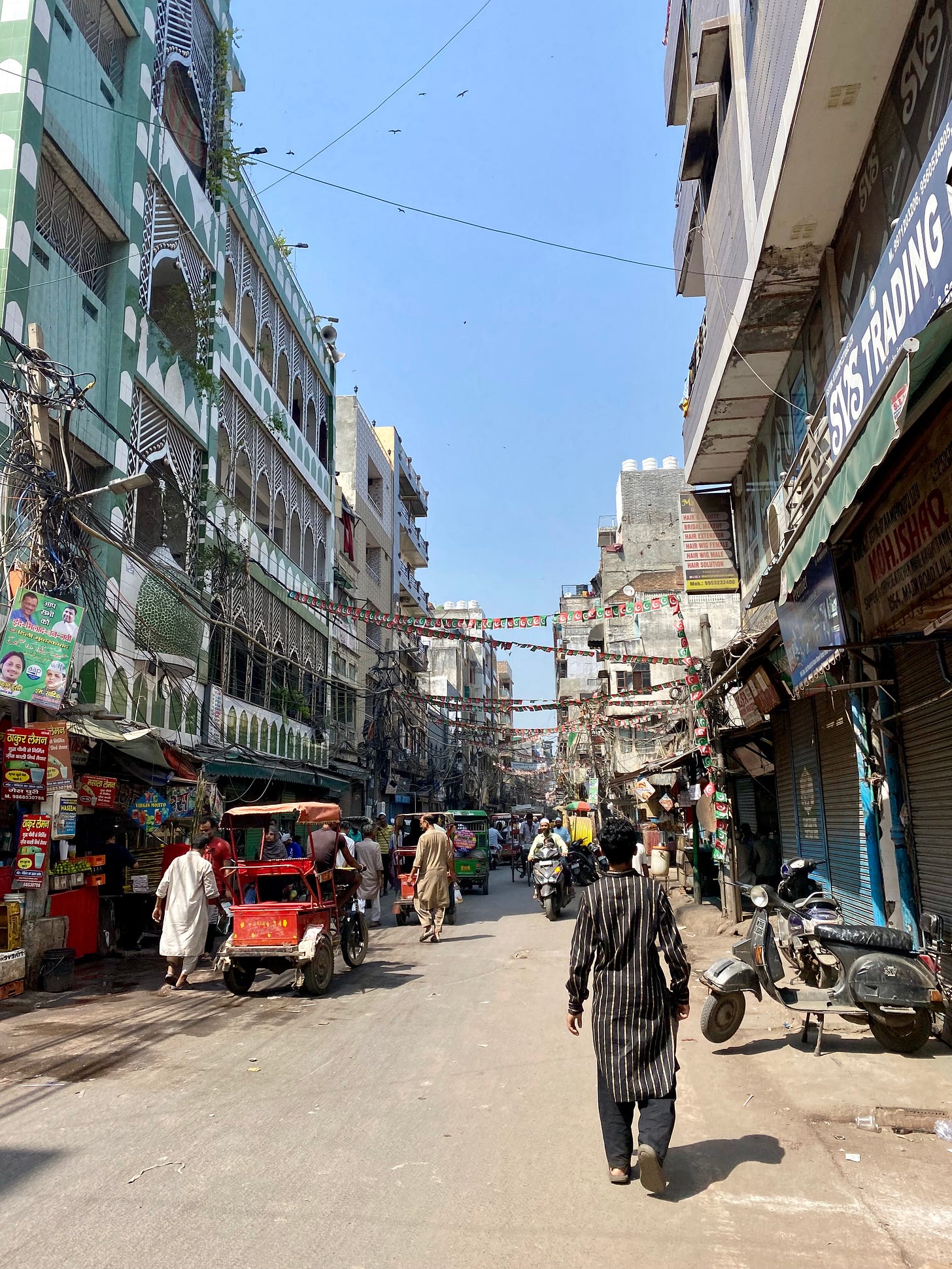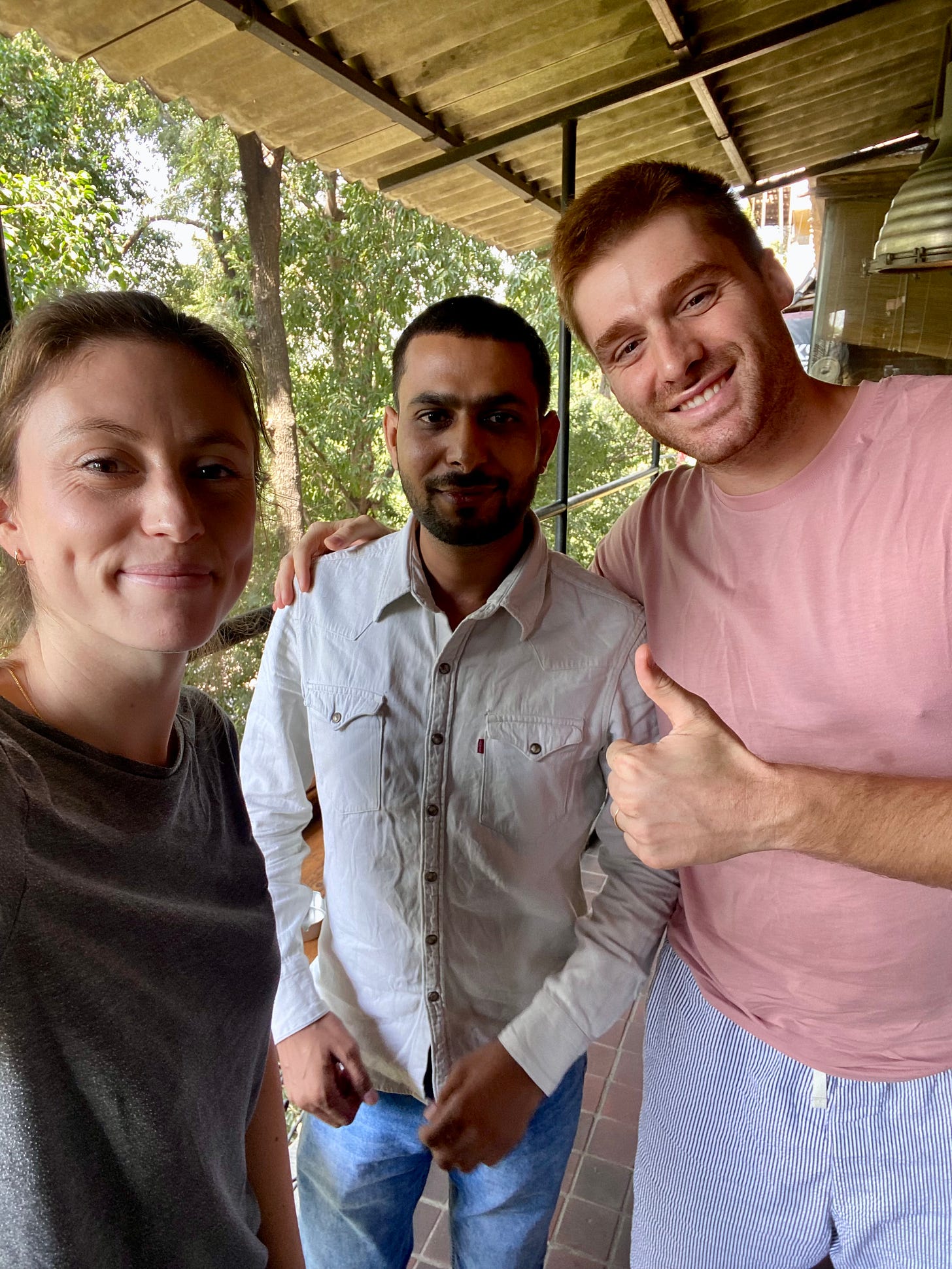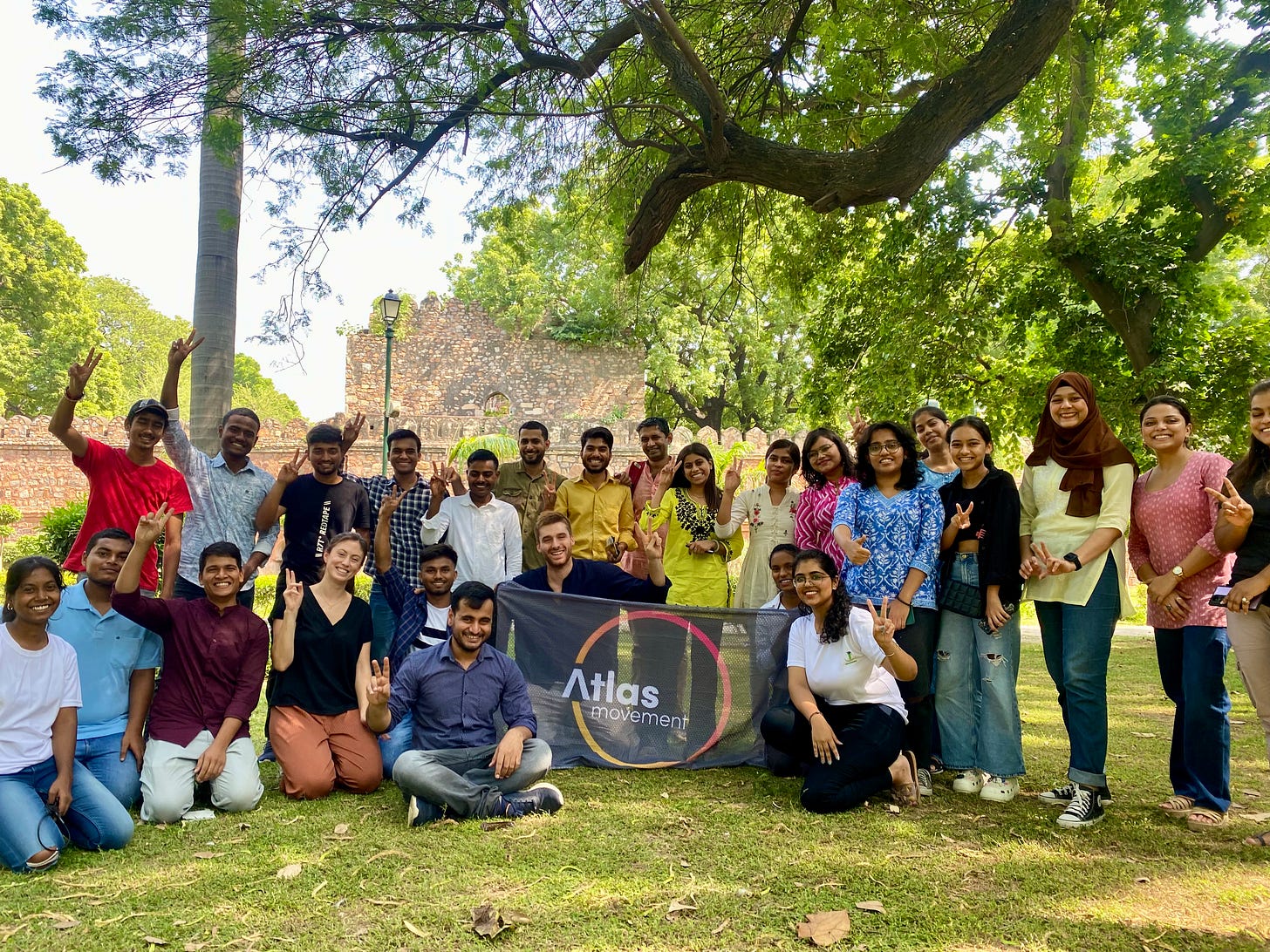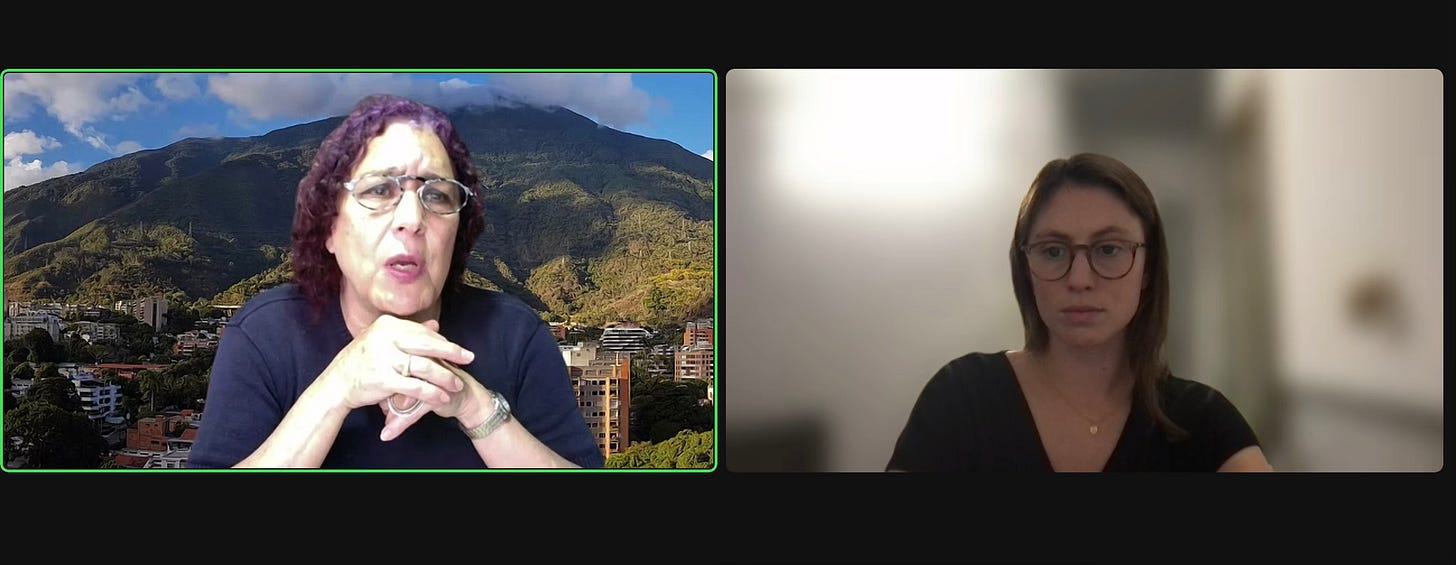Life on the road: a week in Delhi to start a political wave!
And learning about how to get rid of dictators, discovering a disturbing fact about billboards inDelhi and some thoughts on the Israel & Palestine.
Dear friends,
It’s been two weeks since I left my normal life to build Atlas’ political parties worldwide, and I’m now writing from Delhi, my first stop! (Read the first blog for context here).
and I decided to start our work in India: it’s a key player in geopolitical affairs, and we have great people here! We spent this first week in Delhi meeting activists, local leaders and hosting our first political meeting, and I’m still buzzing from it.Read on to hear about our political wave in India, ideas on how to get rid of authoritarian leaders, and what’s happening in Israel and Palestine.
🇮🇳 Destination: Delhi
I spent a full week in Delhi, and let’s just say it’s a lot. In the best of ways. A few friends have asked me to describe this city, and it’s so much that I still can’t find my words. It’s constant chaos and noise that somehow works.
Take the roads, people honk their horns to signal where they are instead of using their indicators when driving. Then think of millions of people doing this.
Yet, you find pockets of calm and peace. Gardens, temples, and even some streets. It’s the case, for example, of the Lotus temple. On my first day in Delhi, we visited the house of the Bahai religion. As Wikipedia puts it, “the Baháʼí Faith is a religion founded in the 19th century that teaches the essential worth of all religions and the unity of all people.” It’s rare to see religions promoting unity for harmony, prosperity and science. Let me just say it: religion is really not my thing. But I was told before coming here that there is a strong link between democracy and spirituality and well-being, and I advised to be open to exploring it. Hence the visit!
Something else that particularly struck me is the fact that you see Modi’s face everywhere. And I mean everywhere. It’s rare to see billboards without him front and centre and some random slogan. Just check those 3 pictures taken within 2 minutes of one another.

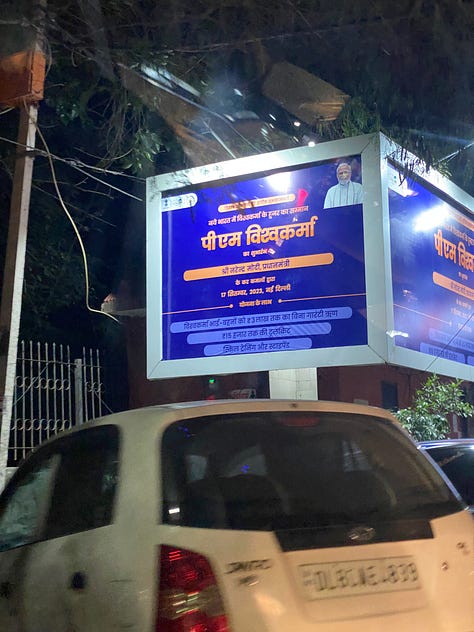
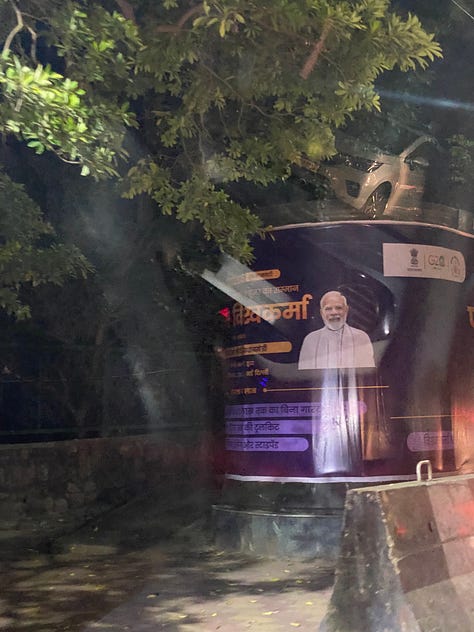
Modi’s strong hand on Indian Democracy
The larger-than-life image that he seeks to project goes hand in hand with Modi’s dangerous tendency toward authoritarianism.
So first, here’s a summary of the situation from Freedom House:
While India is a multiparty democracy, the government led by Prime Minister Narendra Modi and the Hindu nationalist Bharatiya Janata Party (BJP) has presided over discriminatory policies and a rise in persecution affecting the Muslim population. The constitution guarantees civil liberties including freedom of expression and freedom of religion, but harassment of journalists, nongovernmental organizations, and other government critics has increased significantly under Modi. The BJP has increasingly used government institutions to target political opponents.
For more, you can also check Human Rights Watch’s assessment. The latest crackdown on the freedom of the press came this week when Newsclick journalists’ homes were raided and some arrested.
While in Delhi, we met with activists, lawyers, politicians and citizens, all incredibly worried about India losing its democratic structure due to Modi. Here are some key takeaways.
On voicing dissent:
A lot of people asked not to be named. During some of our meetings, we were told by activists how often their offices were raided and the fact that emails were no longer safe to use.
We were told how extremely difficult it is for advocacy groups to be very vocal against the government: their funding can get frozen at any moment.
The governing party has been very successful in pushing forth the idea that anyone criticising its rule is anti-India, and aims to tarnish the image of the country on the international stage. This means that voicing dissent becomes a landmine that can explode anytime. Of course, it should go without saying that holding a government accountable for its human rights violations and mistakes is actually in the best interest of said country. Still, the marketing machine that is the BJP seems unstoppable on this one.

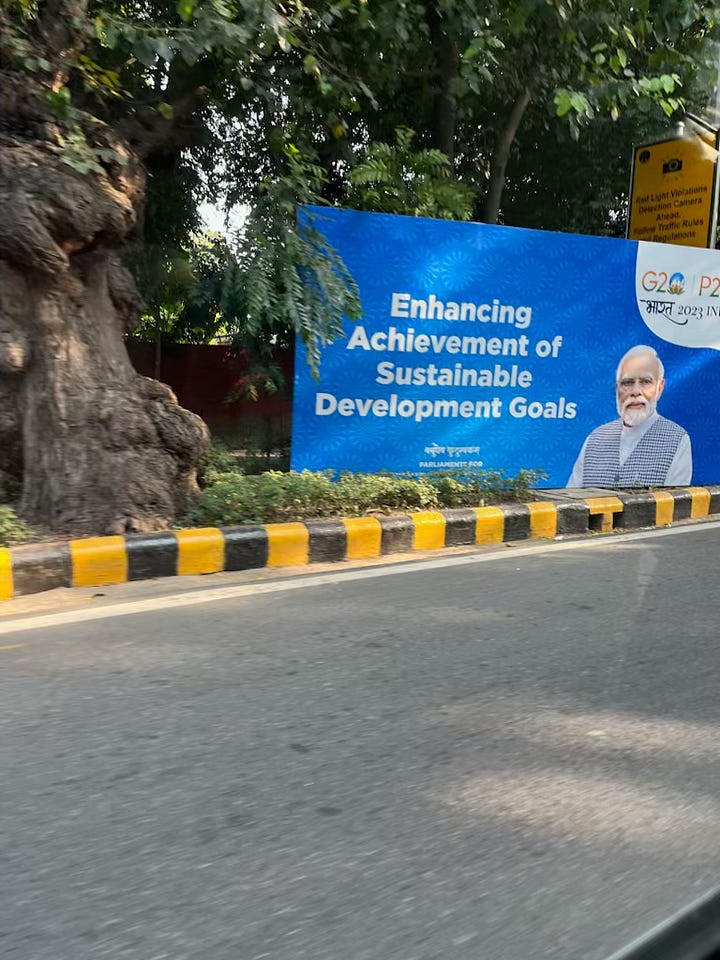
On elections:
People still often vote based on the caste system. What the Modi government is doing is shifting this tendency towards religious-based voting. Both are poisonous options.
Money rules the game. That’s the case in too many countries across the world, but our interlocutors gave a very grim image of the situation. The amount of money poured into campaign financing is enormous, and there is little transparency.
However, the opposition and civil society are uniting in a big coalition - INDIA - to have a common front in the upcoming 2024 national elections to save democracy. You can learn more about it here, it’s a great initiative!
This was a depressing picture, but to be fair, I met mainly with activists and politicians working to change the system and being confronted daily with the difficulties of operating in India and all its issues. Those meetings also gave us so many ideas and reframed quite a bit of our thinking when it comes to doing global politics:
We definitely want to be the political home of activists to ensure that we never lose track of our core battles. People are everything, so working with those who are already putting themselves on the line to achieve change is a great way to start.
The Ghandi-inspired marches seem to still hold a lot of power. Rahul Ghandi walked for 5 months last year in an attempt, according to his Congress party, to unite people beyond divisions and to the government to rebrand himself. Regardless of the intent, walking to meet people, push a message and reflect may just be a great political strategy to incorporate across the world
Go slow, impact long-term change: when launching anything, you are often told about the need to scale fast. But here, I was given the opposite advice and fully intend to follow it: if you go too fast, you won’t be truly anchored in local realities, won’t gain and retain trust, won’t be able to bring out the right message and change. It’s better to pass out on opportunities and take longer but ensure that once you win, you are ready to change the world.
Our first Atlas India event!
In this context, we hosted our first Atlas India event in partnership with the Green Pencil Foundation. This is the first step to establishing a political party capable of pushing our vision of a united world pushing for equity, freedom and well-being.
We talked about how to build a global political wave starting in India and the need to anchor our work:
in Equity, by focusing on employment opportunities for the youth, free education & food security
in Freedom, by bettering democracy and protecting the freedom of speech
in Openness, by opening borders for trade more, we can create opportunities
Finally, we talked at length about the power of a global political party: a clear example is Truth, Reconciliation and Reparations. By being in power all over the world, we can finally address the crimes of the past and act on them, pay reparations, apologise, more and move forward united!
Next up: this was only the beginning. The road ahead is long, we have many more meetings planned, and the team here will drive the work and strategy. However, I can already say that we definitely won’t run in the national elections coming up in 2024: it’s too soon, too big, too fast. Our team will, however, consider how to support the opposition and get ready for students’ politics and potentially city and state elections later in the year.
📣 Let’s talk about global political topics
Israel and Palestine 🇵🇸
Let’s say things clearly: the targeting of civilians is a war crime. It’s unacceptable and must always be condemned, and perpetrators must be held accountable. That’s true for Hamas and for the Israeli state.
Now let’s talk about what keeps on being left out of the media. The root cause of violence is oppression and apartheid, nothing else. To achieve peace and justice, Israel’s occupation, state-sponsored violence, and crimes must end.
Here’s a video with more details:
How to get rid of dictators
The 1 million dollar question: how do we get dictators to leave power when sanctioned and other mechanisms fail? I put this question this week to Tamara Adrian, former Member of the Venezuelan National Assembly and candidate for the 2023 Presidential Primary Elections.
For the last few years, we’ve campaigned, lobbied and protested at Atlas for democracies to unite and create a Union of Democracies to:
create a common front against authoritarianism by coordinating responses to threats, implementing sanctions, supporting freedom fighters, etc
learn from one another and innovate/better democracy at home, and
offer favourable economic and diplomatic conditions to those joining this Union in order to link democracy with prosperity.
But then the question remains, what about dictators that just won’t go away and manage to get stronger thanks to their partnerships with other totalitarian leaders? When talking about Venezuela, Tamara Adrian said: "The only applicable sanctions rights now are financial ones and "moral" ones, but nowadays they are ineffective [dictatorships come together and evade them]. In the meantime, the cost of dictators to leave power has increased a lot because of the International Criminal Court and similar mechanisms.”
She suggested an unpopular approach: create a safe haven, whether officially or unofficially, for dictators willing to leave power to just go and leave the rest of us to rebuild our societies. By being able to leave safely, they might be more willing to abandon power. I imagine this as an island of dictators drinking mojitos on the beach.
I like pragmatic approaches when the idealistic ones don’t work. Still, there are obvious drawbacks to such a controversial approach: 1) wouldn’t it encourage other dictators to behave insanely since they will know that they’ll get a free pass if they leave at one point? 2) what about justice for victims and survivors?
Let me know what you think in the comments, and if you missed it, you can watch this exchange here.
On a side note, she closed with this statement: "My dream is a planet with no country. People are the same everywhere. We have the same dreams, aspirations, abilities. We are divided by borders, created because of religion or just power." We have the same hopes for the future!
💫 Next up: Dharamshala
I’m heading to Dharamshala right now to meet with the Central Tibetan Administration (the Tibetan government in exile) and learn from them how to create kinship beyond borders. I have to admit that this might just be part of this trip that I’m the most looking forward to: the CTA has managed to keep the spirit of democracy and Tibet alive even in exile and still brings together Tibetans scattered around the world. I also can’t wait to learn more about how a global political party might be able to support the fight for liberty.
I’ll then head to Amritsar, Rajasthan, Mumbai, and Bengaluru. If you are around and want to meet, or have contacts and suggestions, reach out and check out the events we already have scheduled.
Let me know what you think, send me your feedback and ideas, and don’t forget to take action to unite the world!
Cheers,
Colombe

